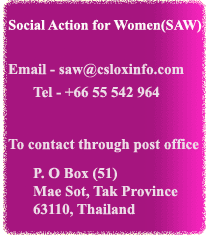Background of Health Program
There is an estimation of over 100,000 Burmese migrant workers living in
As cultural norms prohibit premarital relations, young people are often overlooked by health education projects including family planning and HIV-prevention. Without proper family planning, high numbers of unwanted pregnancies undoubtedly occur. Lack of access to hospitals and clinics probably combined with the comfort that comes with traditional practices, has kept the number of Traditional Birth Attendants (TBAs) high. In addition to aiding in births, some TBAs also perform abortions.
Moreover, an unfortunate consequence of the inhospitable environment for women and families has been a clear trend in child abandonment within the migrant workers' community. A large percentage of abortions and new HIV infections happen in the young migrant community. Many local health facilities report increasing numbers of young people seeking treatment for STDs and the consequences of unsafe abortion.
Many of the migrant workers do not go to area clinics because of financial difficulties and security concerns. In 2000, SAW operated a Mobile Medical Team which treated minor illnesses, assisted with cases of malnutrition and provided health education and awareness for women and children. In cases of serious illness, the Mobile Medical Team arranged and sent migrant workers to Mae Sot hospital and Mae Tao Clinic. In two years of operating the Mobile Health Team, SAW mobile medics treated more then 5,000 patients. SAW stopped it's Mobile Medical Team in 2004 because of security concerns. However, in 2003, SAW started operating Reproductive Health Program.
Reproductive Health Training
Objectives
- To increase knowledge about reproductive and sexual health among 7000 workers from 4 factories and 7 communities in the Mae Sod area.
- To train migrant workers to gain knowledge, skills and confidence in taking care of their own reproductive health needs
- To reduce HIV transmission among Burmese migrant workers
- To provide both physical and mental assistance to women and children
Activities
- Providing health education trainings in migrant communities
- Providing trainings for health educational representatives
- Making group discussions with representatives
- Providing education individually or as a group by the representatives
- Producing educational materials
- Production and distribution IEC materials (manual handbook, pamphlets, posters, condoms)
- Providing health care to women and children living with HIV/AIDS at SAW's Health Care House
Target
- Burmese migrant workers from 4 factories and 7 communities in the Mae Sod and Mae Pa area of Tak province









0 comments:
Post a Comment